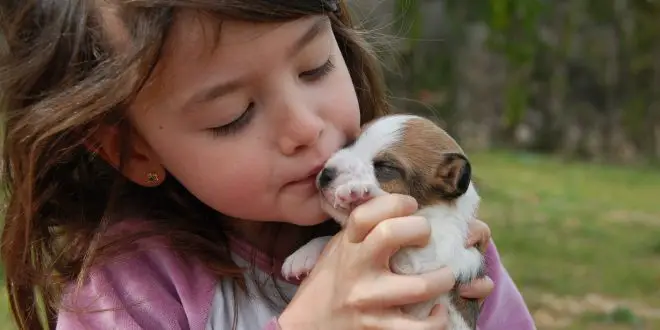Having a toddler in the house is a big challenge not only for us humans, but also for all four legged members of our household.
You must make sure that both you and your pets are as prepared as you can be for the big changes in your life and home that are inevitable with a little one (or ones) around.
This short article will help you get through this stressful time without a hitch.
Dogs don’t understand your child
First of all it’s important to acknowledge one truth. And that is the simple fact that all dogs are different. And I don’t just mean dog breeds, I mean dogs of the same breed are individual.
They have common traits that were bred into them through the generations, but imagine them more like guidelines that your particular dog might follow to the letter or completely ignore. That being said, Jack Russell Terriers may not be the easiest to live with when you have small children around. Wait! Don’t turn your back on them yet, I said “not easy”, I didn’t say impossible.
JRT’s are highly energetic and demanding living companions. Their strong prey drive and fearless attitude in combination with their tendency to bore easily can, if left unsupervised, often lead them into trouble. So, in a way, it’s like having a little kid already.
They too are often stubborn, tend to mess themselves and the place up if given the chance. Also, you have to take care of their diet and make sure they understand the rules and get along with everybody.
There is one difference – patience and understanding. I’m not saying that babies are patient, not by a long shot, but inter-human interaction is much easier than cross-species communication. You know that the child just wants to pet, play, lick, chew or bite the interesting, warm, cuddly little doggy just because it’s awkward and curious and doesn’t want to harm him. Your JRT, or any other kind of dog for that matter, doesn’t.
It may interpret your child’s playfulness for aggression and harm and retaliate in kind. It doesn’t have to be something drastic like serious bodily injury, it can be just a gentle nip that will frighten your kid, then the kid will retaliate, and it just escalates from there.
In addition your dog thinks that your child is just weird – they smell, sound and move completely differently than other humans they encountered and they don’t exactly know what to do and expect.
Create and enforce rules and boundaries
The key is to create and teach boundaries to everybody involved. The children must know how to treat the dog. Children under 8 years of age must never be left alone with the dog! You must always supervise their interactions and teach them how to pet and take care of the dog!
Do not let them pull, grab, or in any other way maltreat the dog! You must teach them to recognize signs of anxiety in the animal and act accordingly – primarily by giving the dog some space.
If you see that there is tension building between them or if the dog starts barking and misbehaving with the children and vice versa – remove the dog from the room and talk with the children about what happened and what they should be doing instead.
Communication and understanding are crucial in building their relationship.
At the same time you should prepare and train your four legged friend to be patient and understanding for children and their mistakes. If you haven’t exposed your JRT to little kids since they were puppies you will have to train them, and that will take some time, effort and patience. Especially if your four legged companion is already a senior citizen and has taken a bit to the grumpy side.
You should expose them to as many people of all ages as possible, especially when they are still puppies. Make it fun for them. Have different people interact with them, try some training exercises and give them treats so your furry friends start associating other people with fun and pleasurable activities.
If you are expecting a baby start preparing before the newborn arrives. Months in advance start playing soundtracks of babies crying to get them accustomed to the noise and reward them generously when they behave nicely.
You could also occasionally use some baby lotion and baby powder to get them accustomed to the smell. Small things like these will go a long way in easing them in the new situation.
We all want what is best for our children and our pets. We want them to be happy, safe and get along nicely. Unfortunately that may not always be the case. Although advice from this article might help you prevent or mitigate some issues that might worry you I must stress again that you should never leave your toddlers alone with your dog.
Always supervise their interactions and be ready to intervene because Jack Russell Terriers aren’t known for their endless patience for childish shenanigans like some other dog breeds. On the other hand, they’ll get along great with older children and will surely be an integral part of all their great adventures.
I would like to hear your advice, thoughts and experiences in the comments below.
 Happy Jack Russell Everything about Jack Russell Terriers
Happy Jack Russell Everything about Jack Russell Terriers





We just had to left our 13 year old JRT because he couldn’t accept my one year baby. He’s been with my husband for 13 years and since he felt that I was pregnant he bite me twice , then when my daughter started crawled he bite her once…it was more like an aware. We thought he wanted to tell her “don’t touch me” but last week he tried again and I was there, so I told him not to do it and he stopped, he just barked at her. So we talked with his doctor and she said that he was building like borders because he started pee on the carpet, specially the places where my daughter play most of the time. She said that in any moment he could attack her again, specially if we weren’t around. It’s heartbroken all this situation. Because he is old and we couldn’t put him down, so we give him into adoption, hopefully he find a good home :(
Dear Laura, I know it’s hard to leave your dog after all these years together, but it’s the only reasonable choice. I hope he’ll find a loving home, too as he still has a lot to offer. Remember that dogs are much more adaptable to new families than we would be. Maybe some good positive reinforcement trainer could help with such situation, but if you didn’t trust him anymore and you were afraid for your child’s life, it’s better to do it this way. Cheers, Ana
My Chihuahua is one year old and my daughter which is 4 my son is 5 my son is scared of him because my puppy growled at him and thought he was gonna bite him my daughter on the other hand ain’t afraid of the puppy what do I do to get him to like my son
Hi Heather, you should help you son relax when he’s beside your dog, try to explain to him why your dog did that and you’ll help them get in a better relationship. Put them at a safe distance and then ask your son to throw a treat to your dog. You should watch closely your dogs’ body language and every time your dog is relaxed your son should tell him he’s a good boy/girl and throw a treat. Repeat that few time a day for some time. You want to learn your dog to connect your son with some good stuff. When you see your dog happily looking at your son, they could try to play some low energy games or learning new tricks. Try to think of activities where there’s no yelling, jumping, running… I know it can be hard with young boys, but be creative.
Also, you teach your kids what growling exactly means and that it’s ok for your dog to feel scared. They should know not to push dogs limits too much.
Besides all of this, for the safety of all of you, you can hire a reputable trainer that uses only positive reinforcement and work with him. He would have the best insight into where your problem lays and how to solve it.
Good luck,
Ana